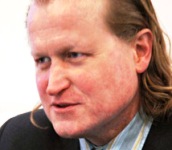2 Dec 2009 | Index Index, minipost, News and features
High Court judge, Mr Justice Eady suggested yesterday that Parliament has no power to repeal privacy laws that have developed over the past decade and claimed he has been singled out as a target by the press. Eady, who has presided over almost all of the most high-profile privacy cases in recent years says he was targeted by Daily Mail editor, Paul Dacre, after he awarded an unprecedented £60,000 in damages to Max Mosley, for a breach of privacy by the News of the World. Eady also said he thought “libel tourism” was a “phenomenon” largely invented by the media. Read more here and here
10 Sep 2009 | Uncategorized
I was down at the De la Warr Pavilion gallery in Bexhill-on-Sea, East Sussex, last Saturdaym marking their exhibition celebrating the conceptual artist Joseph Beuys: trying to talk up the Speakers’ Corner concept as he might have practised it, making free use of an artificially defined environment for freedom of expression.
That is, a cardboard cutout of a giant hat, laid on the floor in the corner of the room for me to stand and speak from. That’s how I came to be challenging personal, public and legal restraints on offensive language in a public place. By swearing like a Baltimore drug dealer, in an art gallery sitting in a town that is a British by-word for genteel sensibility. For an hour…
My justification — echoing Beuys — was that at the real Speakers’ Corner in London you could listen and be offended. Or maybe engaged, informed or free to dispute me. Or just free to walk away and not avail yourself of any of these ‘opportunities’. I was limited only by those personal rules on how far I was prepared to offend; the validity of my case for offending; and the audience’s tolerance, or not, of the offensiveness in question.
I also figured Beuys would allow that by adding an element of performance and political context to offensiveness, your licence to offend is extended. Bill Hicks at one end, maybe Boris Johnson at the other. So I rashly had a go, with the intention of channelling the late master of ideas-in-performance, Ken Campbell as well.
In not-so-short order I cited Jay-Z and Girls Aloud; Victoria Cross winners Guy Gibson and Johnson Beharry; the lexicographer Eric Partridge and Meg Ryan; Voltaire and the Egyptian hieroglyphic roots of the word cunt — which I refused to say, to make a point; Max Mosley, Rachel Cusk, the failings of rights-based jurisprudence, and creating spaces for free expression where the right to be offended, or to offend, is a voluntary affair. Until the law steps in. Choice of context and rules restraining free speech can be voluntary; laws not. Luckily no one called the police.
There was much more, but volume of words proportionately reduced size of audience. The critical view was that it was the rambling eccentric Bexhill local boy Eddie Izzard that I was channelling, well ahead of Ken Campbell, never mind Joseph Beuys. My neighbour Ian Sayers said the effect was a bit like the scene in Life of Brian where aliens drop Graham Chapman in front of an audience expecting a sermon. But I still got the odd laugh.
See the De la Warr Thinking Aloud blog
24 Mar 2009 | Uncategorized
I’ve just got back from the Culture, Media and Sport Committee meeting on press standards, privacy and libel in Whitehall.
The meeting was split into two sittings: the first with journalists, and the second with members of the Press Complaints Commission and the Press Standards Board of Finance.
The journalists’ panel addressed an issue very close to Index’s heart: the UK’s defamation law, and its chilling effect on reporters and editors.
Jeff Edwards of the Mirror told how his paper sometimes found itself shying away from even seemingly innocuous stories about the super-rich, such was the fear of massive legal fees should the subject take umbrage.
Sean O’Neill, crime and security editor of The Times, went further, saying that the use of Conditional Fee Agreements in libel cases is ‘distorting journalism and justice’. He claimed ‘predatory lawyers’ were ready to pounce on newspapers, particularly newspapers that attempted to link certain individuals to Islamist terror and extremism.
On the issue of ‘prior notification’ of stories, which Max Mosley had raised as a possible remedy for the publication of stories that invade privacy, Edwards pointed out that enshrining such a system could prove unworkable: people who knew they were to be the subjects of stories could simply make themselves unavailable to the newspaper, turning off their phone, leaving journalists on a deadline hamstrung.
The Guardian’s Bad Science columnist, Ben Goldacre, raised the idea of a press small claims court, where claims of defamation could be settled quickly, with minimal fees.
The second session focused on the role of the Press Complaints Commission. Under sustained questioning, PCC chair Sir Christopher Meyer launched a sound defence of the PCC and press self-regulation, saying it was the only way to protect free expression while simultaneously encouraging responsible journalism.
Responding to the increasingly multi-platform nature of newspapers, (the Sun’s new online radio show, will for example, be subject to the PCC) Meyer said he hoped that one day soon Ofcom would ‘move out of content’, allowing all media to self regulate.
You can watch the meeting here
7 Nov 2008 | Comment
 Privacy cases in the UK continue to pose a significant challenge to press freedom, says Gavin Millar
Privacy cases in the UK continue to pose a significant challenge to press freedom, says Gavin Millar
(more…)

